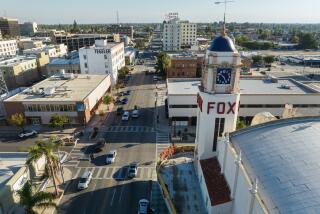City OKs Hotel Subsidy Deal
The City Council agreed Friday to provide up to $177 million in subsidies to developers proposing to build a 55-story hotel and condominium project next to the Convention Center, in the hopes that the project will help make the city-owned center profitable.
“This is a tremendous boon for the city and will complete the concept of downtown as a tourist destination,” said Councilwoman Jan Perry, who represents the area.
The 1,200-room hotel project is a key element of plans by the Anschutz Entertainment Group to build a $1-billion entertainment district surrounding Staples Center.
It is also being touted as critical to bringing business to the Convention Center, which depends on a $20-million city subsidy because it does not attract enough conventions.
“When you go to a convention in the city you want to be close to the convention center,” Councilman Dennis Zine said. “You don’t want to travel miles away.”
Some union leaders and competing hotel owners, as well as taxpayer advocates, oppose the project, calling it an unnecessary gift of city funds to a business.
“If the city has that kind of money to give away, why are they saying they can’t afford to hire more police officers without raising taxes?” asked Kris Vosburgh, executive director of the Howard Jarvis Taxpayers Assn.
The council voted 14 to 0 to approve a memorandum of understanding with the developers that calls for the hotel to get all of the estimated $110 million to $140 million in hotel bed tax revenue it would generate during its first 20 years. In addition, developers would receive $22 million in city loans, $10 million in public improvements and be exempt from $5 million in building fees.
Approval of the memo commits the city to proceed with the hotel on Olympic Boulevard, according to City Administrative Officer William Fujioka.
City officials and the developers have agreed on the broad points of the deal and will negotiate final details in the next 90 days. Among the issues left unresolved are the length and terms of the loan, a possible cap on the bed tax and protections to prevent the city from liability if the hotel does not succeed.
“We are very comfortable with the terms of the [memo] and look forward to finalizing documents so we can push dirt this summer,” said Tim Leiweke, president of Anschutz.
The high-rise would also include 100 luxury condominiums on the upper floor.
The land for the hotel site is owned by Anschutz, but will be developed by Wolff Urban Development and Apollo Real Estate Advisors. Once completed, the hotel would be operated by Hilton.
Leiweke said the hotel has to be built before Anschutz can proceed with its adjacent LA Live, a 27-acre entertainment district that will include a 7,000-seat live theater for concerts, as well as nightclubs, restaurants and movie theaters.
“We are waiting to see this deal and this hotel as a pivotal part of LA Live continue to turn the lights on in downtown Los Angeles,” said Carol Schatz, head of the Central City Assn.
City officials see the hotel as an important element of taking the Convention Center out of the red. Only 15 conventions were booked there last year, down from 35 in 2001.
Some event organizers blamed a lack of nearby accommodations for their decisions to go elsewhere, according to officials with LA Inc., the city’s convention and visitors bureau.
“We are tired of conventions going to neighboring regions and we need to bring them back to downtown Los Angeles,” said Cheyanne Cook of the Los Angeles Area Chamber of Commerce.
The dearth of conventions means the Convention Center has not generated enough money to meet its payments on $525 million in bonds that were issued in 1993 to pay for a major expansion. As a result, the city uses $22 million a year from its general fund, which normally pays for police and fire services, to meet the debt payments on the bonds.
Hotel owners like Peter Zen of the Westin Bonaventure Hotel say that the city is effectively giving a potential competitor an unfair advantage, according to Christopher Sutton, an attorney for Zen.
In addition, the leaders of a union representing building inspectors have opposed the fee waivers because of concern that the lost revenue will force cutbacks that will increase inspectors’ workloads.
Council President Alex Padilla supported the project, but called on negotiators to work out a cap on the amount of bed tax that would go to the hotel, particularly if the revenue exceeds the $140-million projections.
“If this hotel does well, or all of a sudden goes from one operator to a luxury operator [with rooms] at $500 per night, we could be giving away a whole lot more money than $120 million to $140 million,” Padilla said.
More to Read
Start your day right
Sign up for Essential California for news, features and recommendations from the L.A. Times and beyond in your inbox six days a week.
You may occasionally receive promotional content from the Los Angeles Times.







